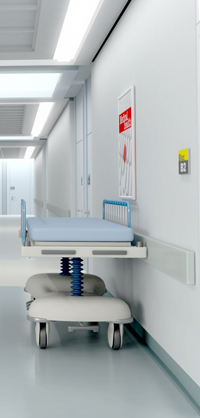Dealing with the health deficit
 The publication of legislation to abolish the HSE, internal disputes between the HSE and the department and budgetary shortfalls have led to more uncertainty for the health sector. eolas reports.
The publication of legislation to abolish the HSE, internal disputes between the HSE and the department and budgetary shortfalls have led to more uncertainty for the health sector. eolas reports.
The Health Service Executive (Governance) Bill provides for the abolition of the board of the Health Service Executive (HSE) and the establishment of a new directorate, headed by a Director General and six directors. These directors will be responsible for primary care, hospital care, mental health, public health and well-being, children and social care.
It is an interim measure on the road to the abolition of the entire HSE which was established in 2005 to replace the 11 health boards.
The Bill aims to strengthen the provisions for ministerial policy directions and priority setting and requires the HSE to account for its performance to the Minister through the Secretary General of the Department of Health. At present, the Minister has responsibility for health service policy while the HSE has operational responsibility for running the health services.
Published by Health Minister James Reilly on 18 July, the Bill resulted in the resignation of HSE Chief Executive Cathal Magee, who said he would have stayed on had the Minister not decided to change the structure of the HSE.
Junior Minister Roisin Shortall and Tánaiste Eamon Gilmore admitted they had only learned of Magee’s resignation through the media, prompting speculation of a rift between the department and the HSE. Fianna Fáil leader Micheál Martin went so far as to claim that Magee had been “shoved from his position in an unacceptable manner”, a claim which was denied by Reilly.
Tony O’Brien, former Chief Operating Officer of the new Special Delivery Unit (tasked with reducing waiting times and trolley numbers), was appointed as Magee’s replacement. He was also former Chief Advisor to the HSE on the implementation of the National Cancer Control Strategy.
These events followed publication of the HSE’s June 2012 Performance Report which showed its overall deficit standing at €298.7 million, adding to speculation that overspend will reach €500 million by the end of the year. Of that deficit,
€151 million came from hospital deficits and €92 million from medical card and community scheme deficits.
That report also showed that 2,950 adults were waiting longer than nine months for an elective procedure (5.5 per cent of the adult waiting list), and 1,251 children were waiting longer than 20 weeks for an elective procedure (29.7 per cent of the child waiting list). The Government has committed to reducing waiting lists to zero by September 2012.
Subsequently, letters between Cathal Magee and Secretary General Michael Scanlan and his predecessor Ambrose McLoughlin emerged showing that Magee had asked, in March, for policy direction to deal with the budget overrun.
Deficits carried over by hospitals from last year, the funding of retirement packages for staff who left prior to pension changes in February, and the failure of the Government to negotiate price cuts with the pharmaceutical industry (or to introduce legislation to improve income charging and collection from health insurers) were cited as reasons for the current deficit.
Magee was told that a high-level group of officials would draw up proposals for consideration e.g. sick leave, locum cover, overtime, more cost-effective prescribing, more flexible rosters and greater redeployment. He was reminded by McLoughlin that as CEO, he had “responsibility and accountability for delivering the national service plan as approved by the Minister.”
Meanwhile, Public Expenditure and Reform Minister Brendan Howlin has reportedly voiced his concern about the overspend, revealing that the HSE has been unable to provide detailed information as to how it will end these spending pressures at joint financial performance monitoring meetings. He warned that if current trends were to continue, the HSE was facing a potential €500 million deficit for the year. The Programme for Government’s health commitments could be rendered “extremely difficult, if not impossible,” he has reportedly said.
James Reilly has acknowledged that “the remainder of this year will be difficult for our health services,” but has insisted that financial problems “will be managed on the basis that services will only be affected as a last resort.”
He has justified the Bill as a means of allowing for “a much clearer line of sight down the budgets, [meaning that] what is destined for primary care stays in primary care.” It is “primarily about the patient, improving patient care,” he added.
Ongoing financial reforms have seen experts being brought into the department, the HSE, the four regions and the primary care reimbursement service, the Minister continued. These included Mark Ogden, a British-based financial management consultant who reviewed the executive’s capacity to handle its budget, and the chief financial officer of St James’s Hospital on secondment.
“It doesn’t matter how eloquently reform is put, if it doesn’t improve the output for patients and the patient experience, it’s valueless,” he stated. “I believe these structural changes are key to delivering for patients and will be judged by the number of people on trolleys or waiting for inpatient and outpatient treatment.”
Micheál Martin has criticised “the series of failures” which came to light in June, and has called for “the preparation of flawed health estimates” to be investigated urgently. “The health budget is out of control and Minister Reilly cannot get away with continuing to put this extremely serious matter on the long finger,” he added. Health Spokesman Billy Kelleher has criticised the ‘in-house’ appointment of Tony O’Brien.
Sinn Féin’s Health Spokesman Caoimhghín Ó Caoláin said the new Bill represents bureaucratic change while cuts to public health services worsen and while the inequitable two-tier structure of the health system remains in place.
He said: “Sinn Féin has called for the restoration of direct ministerial and departmental responsibility for health services which are funded by public money. We have urged the removal of the top heavy bureaucracy of the HSE and a review of managerial and administrative posts within the health service and the Department of Health, eliminating those positions that are surplus to requirements and using the money saved to hire more front line health professionals.”
Health spend: the big ticket items
| HSE overspend (€million) | |||
| Budget | Actual spend | Overspend | |
| Acute hospital services | 1,802.1 | 1,953.4 | 151.3 |
| Primary care reimbursement service | 1,232.0 | 1,324.4 | 92.4 |
| Primary and Community | 2,131.0 | 2,192.2 | 61.2 |
| Corporate services & pensions | 292.9 | 301.0 | 8.1 |
Source: HSE June 2012 Performance report
| € million | 2012 | 2013 | 2014 |
| Budget allocation | 13,644 | 13,565 | 13,359 |
| Savings required | 464 | 563 | 797 |
Source: Comprehensive Expenditure Report 2012-2014





